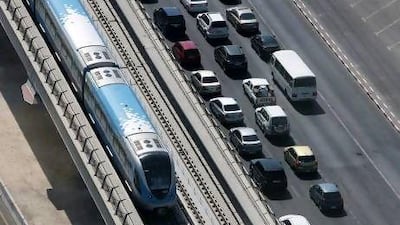DUBAI // Researchers in Dubai are looking at ways to lure people out of their cars and on to public transport, after it was found that nine in 10 motorised trips are made in private vehicles.
The figure is extremely high, exceeding the global average of 60 per cent, and even the Middle East average of 85 per cent.
The fundamental problem is that, despite the UAE's transport infrastructure being regarded as a leader in the region, the car remains the most convenient way to get around.
"It gives you a sense of freedom of movement," said Dr Arun Bajracharya, who conducted the study at the British University in Dubai.
"It gives you a sense of satisfaction and, if used again and again, it becomes attractive and people don't want to use other forms of transportation."
Roads were the priority when Dubai was first developing.
"Before the RTA [Roads and Transport Authority] took over, the main emphasis was expanding the road network," Dr Bajracharya said.
"Settlement is sectored here and roads were sparse, so there was little chance of movement by walking or cycling otherwise."
That problem has not gone away. The city's communities are spread several kilometres apart and with only two metro lines, travelling on public transport takes time.
Cars are cheap in Dubai and the roads are world class, Dr Bajracharya said.
"The costs of maintenance, registration and fuel makes [cars] very affordable," he said. "Because of these factors, people tend to use cars."
And large parts of the city still lack decent public transport. Academic City on the Al Ain Road, where many of Dubai's universities are based, is hard to reach without a car.
"Accessibility and availability isn't there yet," said Dr Bajracharya. "Public transport also takes longer than driving, even with traffic."
Many students at Heriot-Watt University take the Metro to Rashidiya, from where a single bus travels to Academic City.
The bus journey takes an hour, passing through International City and Silicon Oasis.
"If there was a metro a lot of our students would use it," said Chris Burgoyne, the university's student president, adding he would use it instead of driving.
Afshan Pathan, an MBA student at Amity University, who lives in Karama, tried the Metro and bus route. It took an hour and a half - twice as long as the privately operated minibus she now uses.
"There was a lot of waiting time for the bus and then it was a very long journey," Ms Pathan said.
Part of the answer could be dedicated bus lanes to let services run faster. A pilot scheme has set up lanes in Bur Dubai.
But Abdul Ghaffar Chaudhry, a co-researcher on the project, said many incentives and changes to infrastructure across the city would be needed to persuade people to leave their cars at home.
More use could be made of road tolls, much like central London's congestion charge, but good public transport options need to be in place first.
"You can't just charge without giving alternatives," said Mr Chaudhry, who now works in strategic planning at the Roads and Transport Authority.
More frequent metro services have helped but buses are still more popular because the stops are closer to people's homes and workplaces.
"Increasing the [Metro] Green Line will increase this accessibility and connectivity. However, the RTA has changed some bus routes to feed passengers into the Metro."
The relative wealth of Dubai residents is also a problem. About 23 per cent of households earn Dh10,000 or more a month; 30 per cent between Dh5,000 and Dh10,000; and 47 per cent less than Dh5,000.
The second of these income groups - those who still consider cars a luxury - is the main that needs to be lured on to public transport.
"If you can attract this audience, a lot can be done," said Dr Barjracharya.
The Dubai Government wants 30 per cent of journeys to be on public transport by 2030, which is a huge increase from 6 per cent in 2006.
"It's challenging as the population of Dubai keeps expanding, both with natural growth and numbers of expatriates still coming," said Dr Bajracharya.
"It depends on the development of settlements in greater Dubai.
"If we can serve the public giving them better accessibility, people would look to use public transportation."

